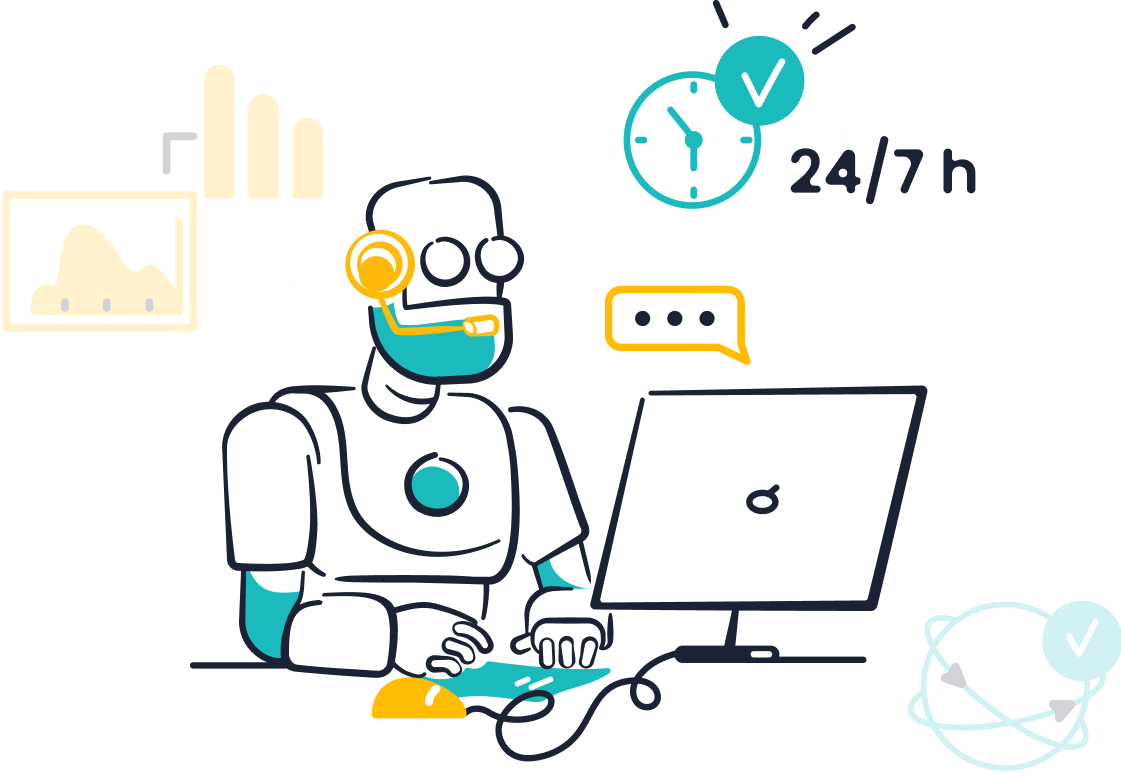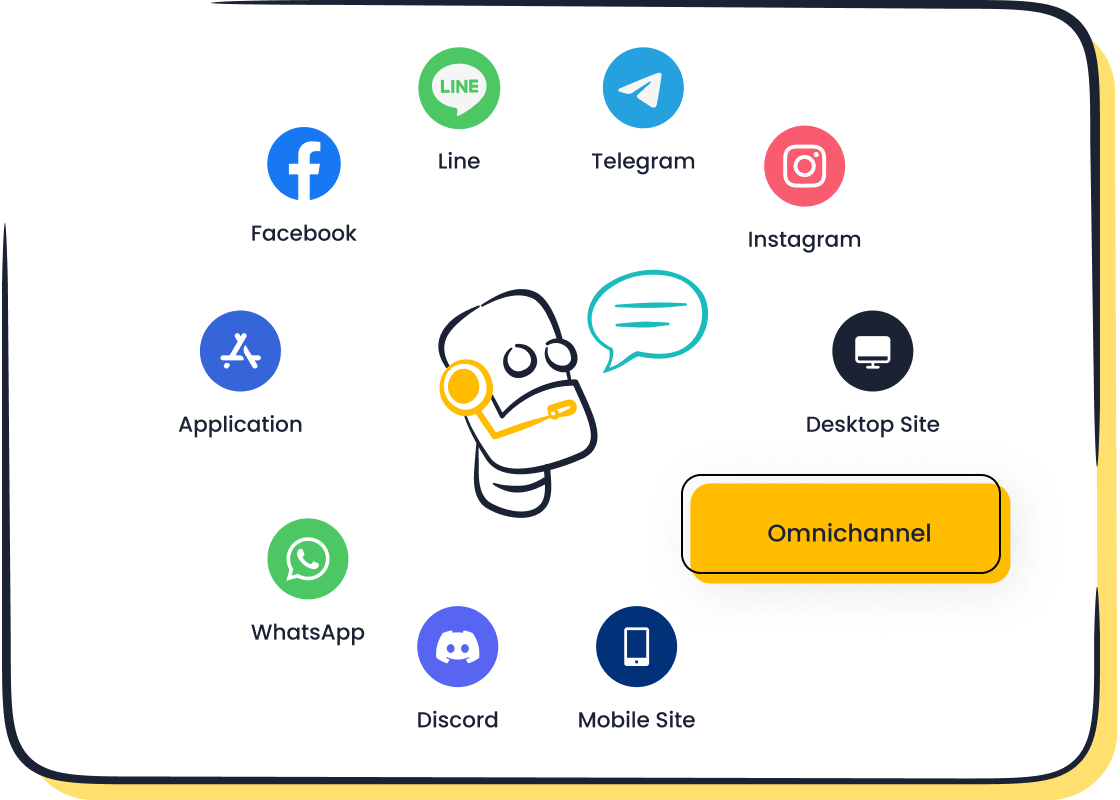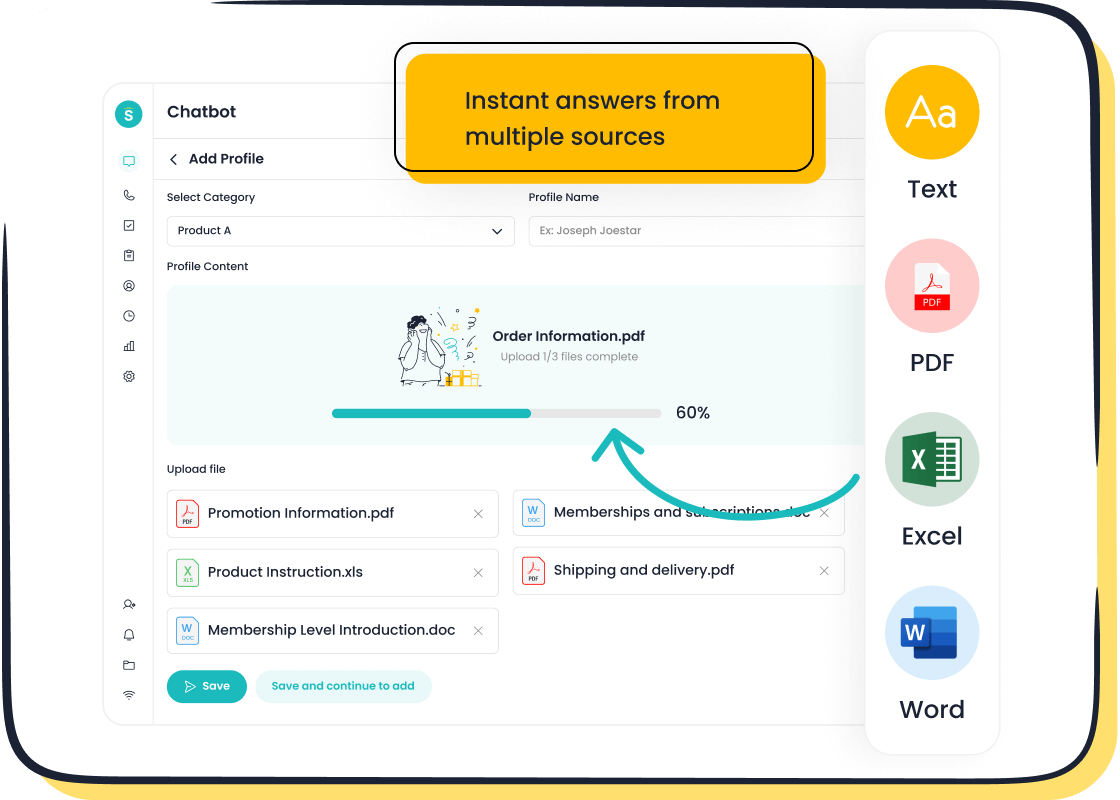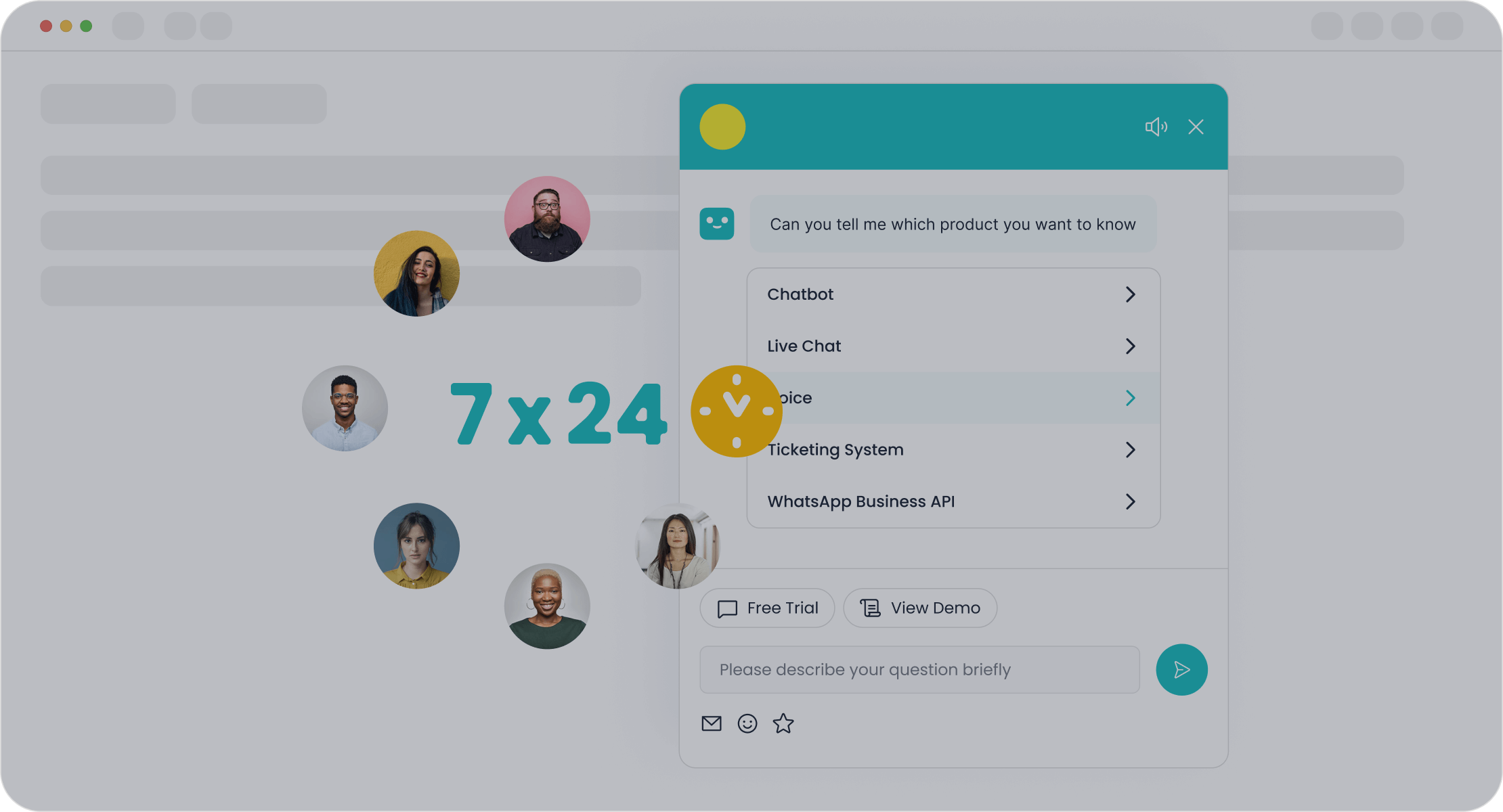AI in Customer Service Practical Tools and Use Cases

AI and automation in customer service are revolutionizing the way businesses interact with their customers, making these interactions faster, smarter, and more efficient. Today, 80% of companies utilize AI to enhance customer experiences, and this number is expected to grow as businesses adopt tools like Sobot's Chatbot. These solutions not only improve efficiency but also provide 24/7 support, meeting the rising demand for instant assistance. With 69% of customers preferring to resolve issues independently, AI-powered self-service options ensure you can access help anytime, anywhere. By automating repetitive tasks, AI and automation in customer service allow businesses to focus on delivering personalized and meaningful service.
Benefits of AI and Automation in Customer Service
Enhancing Efficiency and Reducing Costs
Automating repetitive tasks like ticket routing

AI and automation in customer service streamline operations by handling repetitive tasks such as ticket routing. AI-powered tools can analyze incoming queries and automatically assign them to the appropriate department or agent. This eliminates manual intervention, reducing errors and speeding up response times. For example, Sobot's AI Chatbot can automate ticket routing, ensuring that customer inquiries are directed to the right place instantly. This not only improves efficiency but also enhances the overall customer experience.
Reducing operational costs with AI-powered solutions
AI solutions significantly lower operational costs by optimizing resource allocation and reducing the need for additional staff. According to research, companies using AI report a 35% reduction in customer service costs. Additionally, AI tools like chatbots provide 24/7 support, eliminating the need for round-the-clock staffing. The table below highlights some quantified benefits of AI in cost reduction:
| Evidence Description | Quantified Benefit |
|---|---|
| 82% of companies using AI report positive ROI | Significant financial benefits |
| 68% reduction in staffing needs during peak seasons | Cost savings in operations |
| 37% drop in first response times with AI | Improved efficiency |
Personalization and Customer Insights
Leveraging AI to tailor customer interactions
AI enables businesses to personalize customer interactions by analyzing data and identifying individual preferences. Machine learning algorithms adapt to customer behavior, creating tailored experiences. For instance, AI-driven strategies have led to a 30% increase in customer retention by customizing digital marketing efforts. Sobot's AI Chatbot uses real-time data to provide personalized responses, fostering stronger customer relationships.
Using predictive analytics to anticipate customer needs
Predictive analytics powered by AI helps businesses anticipate customer needs before they arise. By analyzing historical data, AI tools can identify patterns and predict future behavior. This allows companies to proactively address issues or offer relevant solutions. For example, a healthcare provider used AI to manage patient data, reducing administrative costs while improving service delivery.
Scalability and 24/7 Self-Service
Managing high volumes of queries with AI tools
AI tools excel at handling large volumes of customer inquiries simultaneously. This scalability ensures that businesses can maintain high service standards even during peak times. Metrics like ticket volume handled per time unit and first contact resolution rates highlight the efficiency of AI in managing queries. Sobot's AI Chatbot, for instance, can process thousands of inquiries daily, allowing human agents to focus on complex issues.

Providing round-the-clock support with solutions like Sobot's Chatbot
AI-powered chatbots provide 24/7 self-service, ensuring customers receive assistance anytime, anywhere. This is especially beneficial for global businesses operating across multiple time zones. Research shows that self-service options can save companies $1-3 million annually. Sobot's Chatbot offers multilingual support and operates around the clock, making it an ideal solution for businesses seeking to enhance customer satisfaction while reducing costs.
AI-Powered Customer Service Tools and Their Applications

Chatbots and Conversational AI

Examples: Sobot Chatbot, Intercom, and IBM WatsonX Assistant.
Chatbots and conversational AI have become indispensable in modern customer service. These tools leverage AI technologies to provide instant responses, streamline interactions, and enhance customer satisfaction. For instance, Sobot's AI Chatbot offers 24/7 self-service, multilingual support, and proactive messaging, making it a powerful solution for businesses aiming to improve efficiency. Similarly, IBM WatsonX Assistant and other conversational AI tools help businesses deliver personalized experiences by understanding customer intent.
The impact of chatbots is evident in various industries. For example, Sephora's Virtual Artist chatbot uses AI to recommend products and improve the online shopping experience, resulting in higher engagement and conversion rates. In healthcare, Babylon Health's AI chatbot provides affordable consultations, reducing wait times and enhancing accessibility. These examples demonstrate how conversational AI can transform customer interactions across sectors.

Sentiment Analysis Tools
Examples: MonkeyLearn, Lexalytics.
Sentiment analysis tools help businesses understand customer emotions and improve satisfaction. By analyzing feedback, these tools identify positive and negative sentiments, enabling companies to address concerns proactively. For example, MonkeyLearn and Lexalytics use AI to process customer reviews and social media comments, providing actionable insights.
These tools offer several benefits:
- Highlight strengths to enhance customer experience.
- Identify gaps in products or services for improvement.
- Foster trust and loyalty by addressing customer pain points.
By leveraging sentiment analysis, businesses can make data-driven decisions to improve their offerings and build stronger relationships with their customers.
Ticket Automation Software
Examples: Zendesk, Freshdesk.
Ticket automation software simplifies customer service by automating ticket creation and prioritization. These tools use AI to categorize inquiries, assign them to the right agents, and track resolution progress. For example, companies using AI report a 37% drop in first response times, significantly improving customer satisfaction.
A leading pet tech company reduced response times by 30% after integrating AI-powered ticket automation. Additionally, AkzoNobel decreased their average response time from six hours to just 70 minutes. These results highlight the efficiency of AI in streamlining customer service operations.
Voice AI and Speech Analytics
Examples: Google Contact Center AI, Talkdesk.
Voice AI and speech analytics are transforming call center operations by enhancing efficiency and improving customer interactions. Tools like Google Contact Center AI and Talkdesk analyze conversations in real time, providing actionable insights that empower agents to deliver better service. These tools help you understand customer emotions, identify recurring issues, and streamline workflows.
For instance, speech analytics can reduce call resolution times by analyzing past interactions and offering immediate insights. This allows agents to address customer concerns more effectively. Additionally, AI-based voice tools automate routine tasks, enabling agents to focus on meaningful conversations. The table below highlights how these tools improve call center performance:
| Evidence Description | Impact on Call Center Performance |
|---|---|
| AI-based speech analytics improves customer interactions by analyzing conversations. | Enhances customer experience through valuable insights that inform decision-making. |
| Streamlining operations through automation and data analysis. | Allows agents to focus on meaningful interactions, boosting overall productivity. |
| Reduces call resolution times by providing immediate insights from past interactions. | Enables agents to resolve customer issues efficiently, enhancing productivity and customer satisfaction. |
| Identifies and addresses issues effectively through conversation analysis. | Leads to more personalized customer experiences, fostering loyalty and trust. |
| Provides actionable insights for agents navigating complex inquiries. | Reduces time spent on calls, allowing agents to handle a higher volume of requests effectively. |
By integrating voice AI into your customer service strategy, you can enhance productivity and deliver a seamless experience.
AI-Powered Knowledge Bases
Examples: Zoho Desk, Guru.
AI-powered knowledge bases provide instant access to accurate information, benefiting both agents and customers. Tools like Zoho Desk and Guru use AI to organize and retrieve data efficiently, ensuring quick and consistent responses. These systems analyze customer inquiries and prioritize them, helping you resolve issues faster.
For example, an AI-powered knowledge base can provide 24/7 support by accessing a company’s repository of articles, FAQs, and guides. This ensures that customers receive accurate answers without delay. The table below illustrates the contributions of these tools to customer service:
| Functionality | Contribution to Customer Service |
|---|---|
| Quick response times | Provides 24/7 instant responses, enhancing customer satisfaction. |
| Consistent and accurate information | Ensures high-quality responses by accessing the company’s knowledge base. |
| Automated handling of inquiries | Analyzes customer inquiries to prioritize and direct them efficiently. |

Sobot’s AI Chatbot integrates seamlessly with knowledge bases, offering multilingual support and 24/7 availability. This combination ensures that your customers always have access to the information they need, improving satisfaction and loyalty.
Real-World Use Cases of AI in Customer Service

E-commerce and Retail
Using chatbots for product recommendations and order tracking
AI-powered chatbots have transformed the e-commerce landscape by offering personalized product recommendations and seamless order tracking. These tools analyze customer preferences and browsing history to suggest items tailored to individual needs. For example, a chatbot can recommend products based on past purchases, increasing the likelihood of a sale. This approach not only enhances the shopping experience but also boosts customer satisfaction. Additionally, chatbots provide real-time updates on order status, ensuring customers stay informed without needing to contact support.
Leveraging sentiment analysis to improve customer satisfaction
Sentiment analysis tools help e-commerce businesses understand customer emotions by analyzing reviews and feedback. This insight allows you to address concerns proactively and improve service quality. For instance, analyzing negative sentiments in product reviews can highlight areas for improvement, while positive feedback can guide marketing strategies. By leveraging AI-driven sentiment analysis, you can foster trust and loyalty, ultimately enhancing the overall shopping experience.
Financial Services
Automating fraud detection and customer inquiries
AI plays a crucial role in automating fraud detection and managing customer inquiries in financial services. AI-driven systems analyze transaction patterns to identify fraudulent activities, protecting both businesses and customers. Additionally, chatbots handle routine inquiries, such as account balances or transaction details, reducing response times by 30%. Self-service solutions, like those implemented by ECSI, contain over 50% of interactions, easing agent workloads and improving efficiency. Automated caller authentication further saves one to three minutes per interaction, streamlining the process.
Enhancing customer experience with virtual assistants
Virtual assistants powered by AI provide 24/7 support, addressing inquiries without delays. These tools handle multiple queries simultaneously, reducing wait times and improving resolution speed. For example, a virtual assistant can guide customers through complex financial processes, such as loan applications, with ease. This personalized assistance enhances customer satisfaction and builds trust in your services.
Healthcare
Streamlining patient support with AI chatbots
AI chatbots revolutionize patient support by offering instant assistance and reducing administrative burdens. They answer common questions, provide health information, and guide patients through processes like insurance claims. This automation allows healthcare providers to focus on critical tasks while ensuring patients receive timely support. For example, chatbots can handle thousands of inquiries daily, improving accessibility and efficiency.
Managing appointment scheduling and follow-ups
AI simplifies appointment scheduling and follow-ups, reducing no-shows by up to 30% and wait times by 80%. These systems send automated reminders and optimize schedules, improving utilization by 33%. The chart below highlights the impact of AI on healthcare operations:

By integrating AI into your healthcare services, you can enhance patient experiences and streamline operations.
Telecommunications
Resolving technical issues with AI-driven troubleshooting tools
AI-driven troubleshooting tools have revolutionized how you can address technical issues in the telecommunications industry. These tools use advanced algorithms to analyze problems and provide instant solutions. For example, AI agents equipped with Natural Language Understanding (NLU) interpret customer queries effectively, offering real-time assistance. This reduces the need for human intervention and ensures faster resolutions.
A telecommunications company using Mediatel's voicebot improved its First-Contact Resolution (FCR) by 78%. This enhancement not only boosted customer satisfaction but also streamlined operations. Additionally, AI solutions significantly reduced Average Handle Time (AHT), allowing agents to focus on more complex issues. The table below highlights the impact of AI on customer service in telecommunications:
| Metric | Impact on Customer Service |
|---|---|
| First-Contact Resolution (FCR) | Improved by 78% using AI voicebot |
| Average Handle Time (AHT) | Reduced significantly through AI solutions |
| Agent Productivity | Increased by 20% with real-time assistance |
| Customer Effort Scores | Lowered due to quick self-service options |
By integrating AI into your service strategy, you can resolve technical issues efficiently and enhance customer experiences.
Improving customer retention through predictive analytics
Predictive analytics powered by AI helps you retain customers by anticipating their needs and addressing potential issues proactively. These tools analyze historical data to identify patterns, enabling you to offer personalized solutions. For instance, AI agents provide 24/7 assistance, ensuring customers receive instant responses to their queries.
A telecommunications company leveraging real-time agent assistance saw a 20% increase in agent productivity and a 15% improvement in FCR. These advancements directly contributed to higher customer retention rates. Moreover, AI-enabled teams resolve customer issues 44% faster, reducing frustration and building loyalty. With 90% of customers expecting instant responses, predictive analytics ensures you meet these expectations while fostering trust.
Sobot's Success Story: Agilent
Achieving a sixfold increase in efficiency with Sobot's Chatbot

Agilent, a leader in life sciences, partnered with Sobot to overcome challenges in managing high inquiry volumes. By implementing Sobot's AI-powered chatbot, Agilent achieved a sixfold increase in efficiency. The chatbot handled routine inquiries autonomously, allowing human agents to focus on complex tasks. This streamlined approach improved operational workflows and reduced response times.
The chatbot's multilingual support and 24/7 availability ensured customers received timely assistance, regardless of their location. Additionally, Sobot's intelligent routing system directed inquiries to the appropriate skill groups, enhancing problem resolution rates. These features significantly boosted Agilent's customer service performance.
Reducing costs and improving customer satisfaction scores
Sobot's solutions not only enhanced efficiency but also reduced Agilent's operational costs by 25%. The AI chatbot triaged inquiries effectively, cutting the need for additional staffing. This cost-saving measure allowed Agilent to allocate resources more strategically.
The results speak for themselves. Agilent achieved a customer satisfaction score of 95%, reflecting the improved quality of service. Over 80% of inquiries received accurate responses from the chatbot, further enhancing customer trust. The chart below illustrates the efficiency metrics achieved through Sobot's solutions:

By adopting Sobot's AI-powered tools, Agilent transformed its customer service operations, setting a benchmark for efficiency and satisfaction.
Addressing Common Concerns About AI in Customer Service
Accuracy and Reliability
How AI tools handle complex queries and edge cases
AI tools excel at managing routine tasks like FAQs and order tracking, handling up to 80% of customer support interactions. However, complex queries often require human intervention. For instance, 75% of customers feel chatbots struggle with intricate issues, leading to occasional inaccuracies. To address this, companies integrate human oversight to manage the remaining 20% of interactions, ensuring quality and precision.
Testing AI tools thoroughly is essential to maintain reliability. Any glitches or errors can harm your brand's reputation. The table below highlights key concerns about AI accuracy:
| Evidence Type | Description |
|---|---|
| Reliability and Accuracy | AI tools must be tested to ensure accurate responses and avoid errors. |
| Customer Sentiment | 75% of customers believe chatbots fail with complex issues. |
| Support Team Confidence | 55% of teams think AI tools like ChatGPT can provide incorrect information. |
| Inaccuracy Rate | 40% of users report occasional inaccuracies in AI outputs. |

The role of human oversight in ensuring quality
Human oversight plays a critical role in maintaining the quality of AI-driven customer service. While AI handles repetitive tasks efficiently, human agents step in for complex problem-solving and emotionally sensitive situations. This collaboration ensures accurate responses and builds trust with your customers.
AI vs. Human Agents
Why AI complements rather than replaces human agents
AI enhances customer service by automating routine tasks, allowing human agents to focus on more complex issues. For example, Liberty London uses AI to identify customer intent, enabling agents to resolve problems effectively. This division of labor improves overall service quality. Additionally, 69% of businesses report better customer experiences due to AI integration.
- 36% of experts highlight AI’s role in providing 24/7 availability.
- 31% appreciate its ability to save time and automate manual tasks.
The importance of human empathy in customer service
AI tools can generate empathetic responses, but they lack the genuine emotional connection that human agents provide. Customers value empathy, especially in emotionally charged situations. Human agents act as advocates, offering personalized solutions that foster loyalty and trust. This balance between AI efficiency and human empathy ensures a superior customer experience.
Limitations of AI
Challenges in understanding context and emotions
AI struggles with understanding context and detecting emotions accurately. While it can simulate empathy, customers often recognize the artificial nature of these interactions. This can reduce trust, especially in sensitive scenarios. Ethical concerns also arise when relying on AI for emotional support, as it lacks the judgment needed to navigate complex situations.
Dependence on high-quality data for training
AI relies heavily on high-quality data for training. Inaccurate or biased data can lead to flawed outputs, impacting customer satisfaction. Regular updates and monitoring are essential to ensure AI tools remain effective and reliable in delivering customer service.
The Future of AI in Customer Service
Emerging Trends in Conversational AI
The rise of voice assistants and natural language processing
Voice assistants and natural language processing (NLP) are reshaping how businesses interact with customers. These technologies enable conversational AI to understand and respond to queries more naturally, creating seamless communication. For instance, tools like voice-enabled chatbots can interpret spoken language, making customer interactions faster and more intuitive. By 2024, 49% of customer service professionals believe AI will independently handle most tasks, including voice-based interactions.
The growing reliance on voice assistants reflects consumer demand for instant, hands-free solutions. A recent study shows that 52.4% of Americans expect AI to improve customer service by providing 24/7 assistance without wait times. This trend highlights the importance of integrating voice AI into your customer service strategy to meet evolving expectations.
| Statistic | Insight |
|---|---|
| 2024 Expectation | Businesses predict AI will assist in roles like chatbots and voice AI. |
| Consumer Optimism | 52.4% of Americans expect AI to enhance customer service experiences. |
| Instant Response Expectation | 90% of customers want immediate responses from AI-driven tools. |
Integration of AI with omnichannel customer support
The integration of AI with omnichannel support ensures consistent service across platforms. Conversational AI connects various channels, such as email, live chat, and social media, into a unified system. This approach allows businesses to deliver personalized and efficient customer experiences. For example, Sobot’s AI Chatbot offers omnichannel support, enabling customers to interact seamlessly across their preferred platforms.
By 2026, conversational AI is expected to reduce contact center labor costs by $80 billion. This cost-saving potential makes AI integration a strategic priority for businesses. Additionally, 68% of users appreciate the speed of chatbot responses, further emphasizing the value of AI-powered self-service.

Long-Term Implications
How AI will shape customer expectations and experiences
AI in customer service is transforming expectations. Customers now demand faster, more accurate responses. Chatbots and other AI tools meet these needs by providing instant assistance and personalized solutions. By 2025, 80% of companies plan to adopt AI-powered chatbots, reflecting their growing importance in customer service.
Generative AI also plays a key role in enhancing experiences. A recent survey found that 92% of decision-makers believe generative AI improves customer service. This technology enables businesses to anticipate needs, offering proactive solutions that build trust and loyalty.
| Statistic | Description |
|---|---|
| 80% | Companies using or planning to adopt AI-powered chatbots by 2025. |
| 92% | Decision-makers agree generative AI enhances customer service experiences. |
The evolving role of customer service professionals
AI is not replacing human agents but redefining their roles. Automation handles repetitive tasks, allowing professionals to focus on complex issues requiring empathy and critical thinking. By 2024, 61% of specialists plan to integrate AI into their roles, highlighting its complementary nature.
This shift benefits both businesses and employees. AI reduces workloads, enabling agents to deliver higher-quality service. For example, Sobot’s AI Chatbot assists agents by triaging queries, improving productivity by 70%. As AI continues to evolve, customer service professionals will play a more strategic role in delivering exceptional experiences.
AI has transformed customer service by enhancing efficiency, reducing costs, and personalizing interactions. Businesses now enjoy 24/7 support, faster response times, and improved customer satisfaction. For instance, 91% of companies using AI report satisfaction with its impact, while 94% note increased productivity among customer service specialists.
Sobot exemplifies innovation in this space. Its AI-powered Chatbot streamlines communication, resolves inquiries efficiently, and boosts customer happiness rates to 99%. With features like multilingual support and intelligent routing, Sobot ensures seamless customer experiences.
Looking ahead, AI will continue to revolutionize customer service. By 2027, the AI customer service market is projected to reach $4.1 billion, reflecting its growing importance. As businesses adopt AI, they will redefine customer expectations, delivering faster, smarter, and more personalized solutions.

FAQ
What is the main advantage of using AI in customer service?
AI in customer service enhances efficiency by automating repetitive tasks like ticket routing and FAQs. For example, Sobot's AI Chatbot improves productivity by 70% and reduces costs by up to 50%. This allows your team to focus on complex customer needs while maintaining 24/7 support.
Can AI-powered tools like Sobot's Chatbot handle multiple languages?
Yes, Sobot's Chatbot supports multilingual interactions. It communicates with customers in their preferred language, ensuring a seamless experience. This feature is especially useful for global businesses aiming to provide personalized and accessible customer service across different regions.
How does AI improve customer satisfaction?
AI tools analyze customer data to deliver personalized experiences. Predictive analytics anticipate needs, while chatbots provide instant responses. Sobot's Chatbot, for instance, offers proactive messaging and real-time assistance, boosting customer satisfaction scores to 95%, as seen in Agilent's success story.
Is AI reliable for managing complex customer queries?
AI excels at handling routine inquiries but may require human oversight for complex issues. Sobot's solutions combine AI efficiency with intelligent routing, directing intricate queries to skilled agents. This ensures accurate resolutions and builds trust with your customers.
How can AI reduce operational costs in customer service?
AI-powered tools like Sobot's Chatbot operate 24/7, reducing the need for additional staff. By automating workflows and triaging queries, businesses save up to 50% on costs. For example, Agilent achieved a 25% cost reduction by integrating Sobot's AI solutions into their operations.
See Also
Transforming Customer Support With AI Service Agents
Essential Practices for Quality Management in Call Centers
Understanding QMS Principles for Effective Call Centers
Best AI Solutions for Enterprise Contact Centers Revealed
Enhancing Efficiency With AI-Driven Customer Service Software